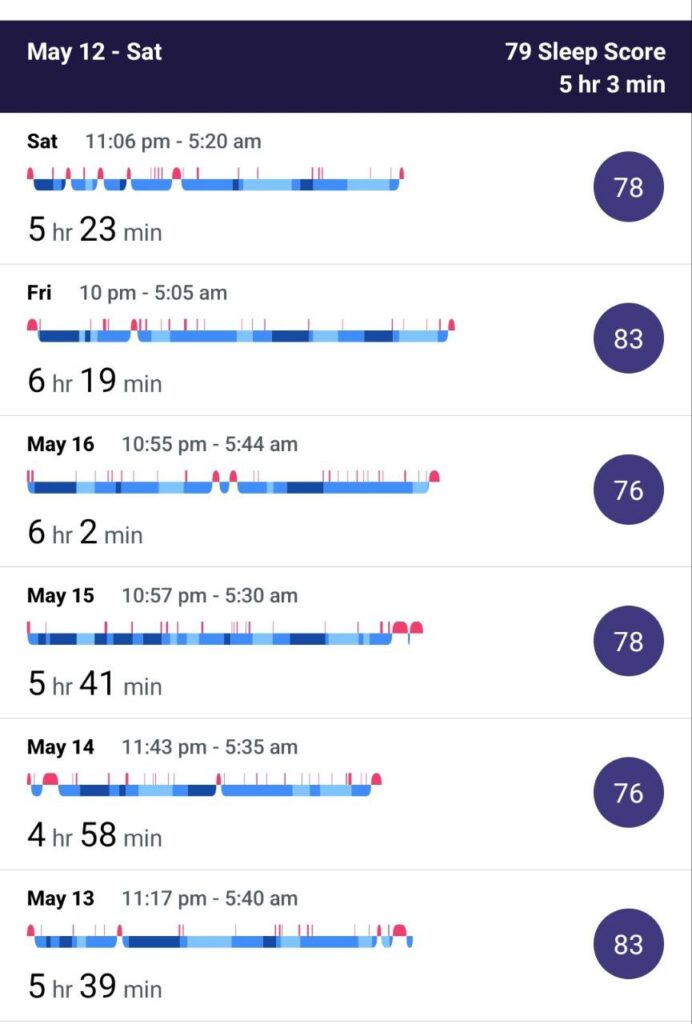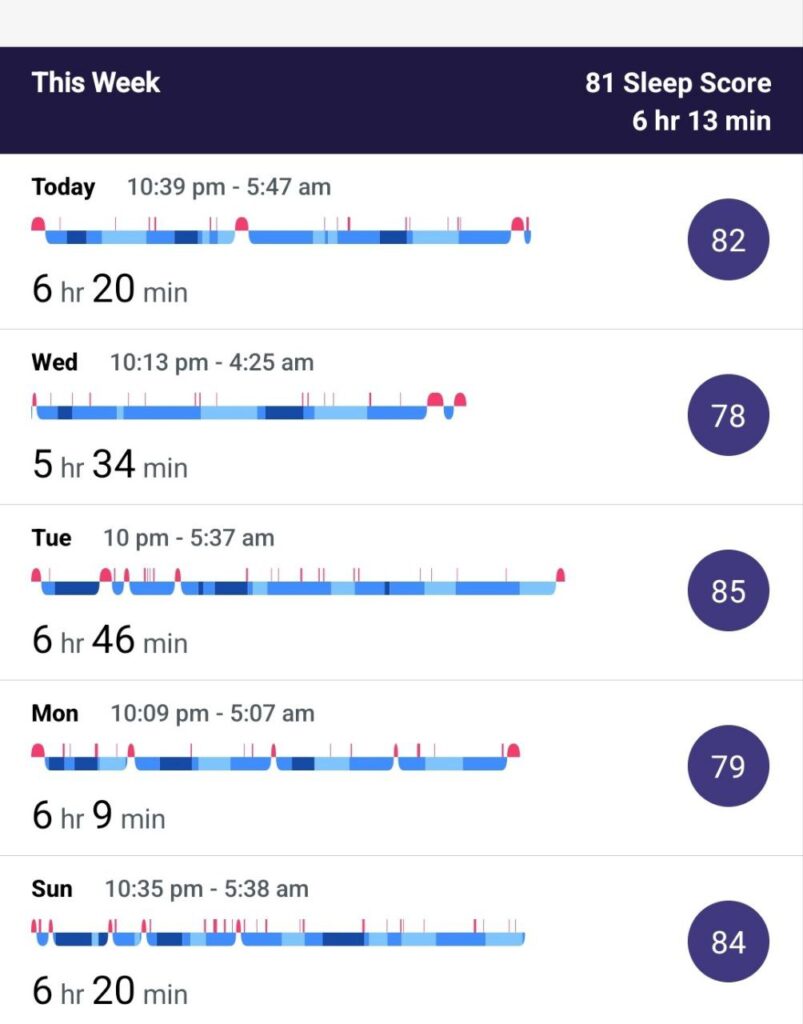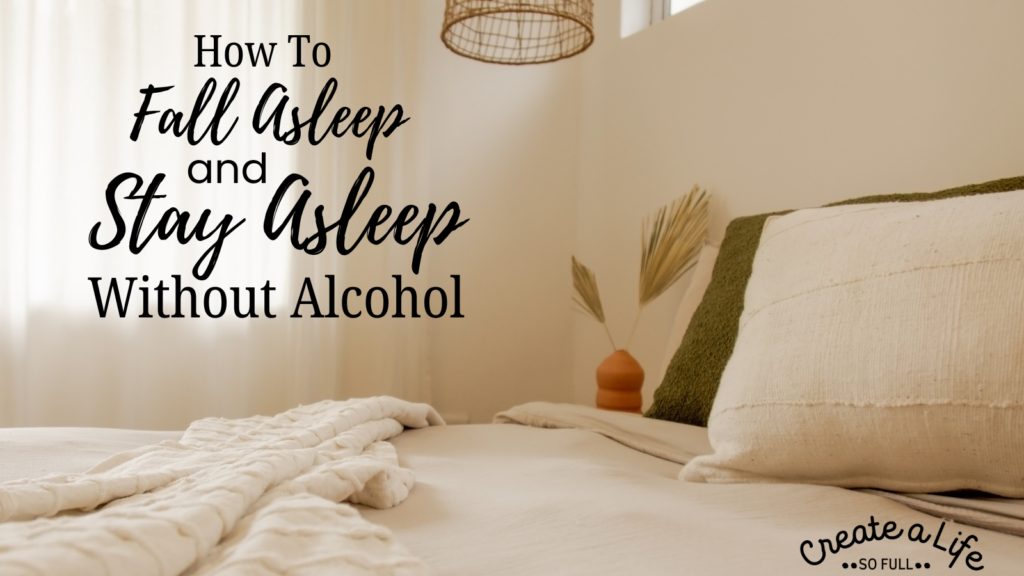If you’ve quit drinking, and now sleep feels impossible, you’re in the right place.
Nothing is more frustrating than knowing you won’t wake up with a hangover… but that you’ll wake up grumpy and still exhausted instead.
I’ve been there. When I got quit drinking, I struggled with all of it – falling asleep, staying asleep, and really feeling like I was getting quality sleep. I tried taking supplements and medications, and even resorted to taking Benadryl every night (terrible idea!) before I finally figured out a system that actually works.
In this blog, you’ll find all the steps I took to create my Sober Sleep System:
- How to master your mindset so you stop sabotaging yourself
- How to create a bed time routine that sets you up for deep, restorative sleep
- The toolbox you’ll use to make sure you fall asleep and stay asleep, starting tonight
Armed with this info, you’ll be able to get started creating your own system, and finally get the rest you’re so desperately needing.
How This Sober Sleep System improved every aspect of my sleep
Back when I first implemented the Sober Sleep System, I tracked my sleep patterns with my Google Fitbit. In just one week of consistent effort, I
- Increased my sleep by over one extra hour per night
- Fell asleep quickly by 10:30 every night
- Improved the quality of my sleep by 2 points on Fitbit’s scale (these days I usually average in the 90’s)
This is how my sleep was for years – falling asleep too late, lucky if I got over 5 hours, with some insomnia mixed in just for fun. My goal is to sleep by 10:30 pm, and get 6-7 hours per night.* I was nowhere close to that.

This is the result after just one week of implementing the Sober Sleep System I developed – 6.25 hours of sleep per night, and asleep by 10:30.

*This is the ideal amount of sleep for me. Most adults need between 6 and 9 hours of sleep, so your goals may vary.
Everything I’m sharing with you today are things you can implement now.
There’s nothing difficult or complicated about this system. It just takes consistency. But here’s the kicker – you’ve got to actually commit to doing this stuff, if you want to see the results. You can come up with excuses, but that will just keep you stuck and sleepy. It’s all about what you choose to make a priority. If sleep is a priority for you (and it should be!) then you’ll make the changes necessary to improve it.
Master Your Mindset
You’re gonna have to change the way you think if you’re going to start getting more sleep.
Setting yourself up for sleep success means understanding what you think about sleep and alcohol, and changing those to thoughts that will better support your goals. Here are some common beliefs, and how you can change them.
“Alcohol helps me sleep better.”
According to the Sleep Foundation alcohol use even in small quantities negatively affects sleep by causing a significant decrease in sleep quality and an increase in sleep disturbances. This leaves you feeling tired and unrested the next day.
A moderate serving of alcohol causes a 24% decrease in REM sleep. “Moderate” here is defined as 2 drinks for men and more than 1 drink for women. Why is REM sleep important? REM sleep is when your body heals, retains memories, and provides the rest you need to feel refreshed the next day. REM is when your body is doing the hard work of healing, now that you’re not drinking alcohol anymore.
Change it up: Instead of “Alcohol helps me sleep better,” remind yourself that “Alcohol made me fall asleep faster, but it also ruined my sleep quality.”
“I can’t fall asleep without alcohol.”
While it’s true that alcohol is a depressant with sedative effects, we can’t deny that alcohol also disrupts your sleep throughout the night. If you’ve relied on alcohol to help you fall asleep for a long time, you’re going to have to make some changes in order to teach yourself to fall asleep without it. But that is entirely possible, and it’s what we’re going to cover in the next section.
Change it up: Instead of “I can’t fall asleep without alcohol”, acknowledge that “I’ve used alcohol in the past, but now I’m going to learn new, healthier ways to fall asleep at night instead.”
“I don’t have time For Routines.”
We all have exactly the same amount of time in each day. It’s all about what you choose to prioritize. Self discipline sometimes means giving up a bit of time you’d normally spend doing something more fun, so you can prioritize the habits necessary for your health. It means choosing to do the hard thing instead of the easy thing – and reaping the benefits of that decision.
And really… most of us spent the last 5+ hours of each day drinking. So it’s usually pretty easy to find the time, if we look hard enough.
Change it up: Instead of “I don’t have time for routines,” tell yourself “I’m in control of how I spend my time, and I have the power to make time for things that are important to me.”
“I’m Just Not Good At This Stuff.”
No one is good at anything when they first start. It feels uncomfortable – and by nature, those of us who drank too much generally did everything we could to avoid feeling uncomfortable. The only way you get good at it is by deciding you’re going to. Deciding that you’ll make it important enough in your life that you practice every day, without giving up.
Change it up: Instead of “I’m just not good at this stuff”, remind yourself that”This might not be easy or comfortable, but eventually it will be. I just need to commit and stick it out.”
Reconsider Your Routines
A night time routine is an absolute must if you’re wanting to get better sleep.
Going through the same process every night signals to your body that it’s time to start winding down. That’s what we’re after here – sending your body the same signals, every night. Give yourself about an hour, if you can, to move through your bed time routine.
Go to bed and wake up at the same time every day.
(Yes, even on weekends.)
Creating a sleep routine helps your body know what to anticipate. You’ll find that you naturally become more tired and feel more ready for bed shortly before bedtime, if it’s the same time each night.
Waking up at the same time – even if you’re still tired – will help you feel more tired at night, too – making it easier to fall asleep quickly. At some point, you can be a bit more flexible with this, but when you’re just starting out, try to stick with it as much as you can.
Set the Scene & Self care.
What do you need to do to take care of yourself each night?
Some ideas:
- a luxurious skin care routine
- make a cup of high quality hot tea
- light a special candle or incense
- dim the lighting
- cuddle a pet
Choose one or two things that help you feel settled, and bring a sense of peace to your world. They don’t have to be complicated or expensive. It’s all about creating a space that’s conducive to rest and sleep.
Jot Things In A Journal
Clear Your Mind.
I like to dump any remaining thoughts for the day into my journal before I had to bed. Nothing long and drawn out – just things that are still swirling in my mind from the day behind me, items for me to-do list, things I want to remember. Another option is a gratitude journal. Take a few minutes to write a short list of things you’re grateful for.
Screens off for 30 minutes before sleep.
Electronic devices disrupt your sleep cycle.
They emit blue light that can suppress melatonin production and alter circadian rhythms, leading to disorganized sleep patterns. Alcohol already disrupts the production of important hormones related to both sleep and mood, and it takes some time for those hormone leves to normalize again. Give your body a chance to regulate for awhile before you ask it to relax and go to sleep. Turn all your electronics screens off 30 minutes (or even 60 minutes) before you turn out the lights. If you feel bored, grab an (actual paper) book and read for awhile.
Make your bed each morning.
A poll by the National Sleep Foundation found that people who made their bed each morning were 19% more likely to report a good night’s sleep. Crawling into a made bed at the end of a long day sends a signal to your body that it’s time to relax. It’s also important to note that people who have a tidy, well organized bedroom also sleep well. So if your bedroom is messy – take some time to straighten in up!
Create white noise.
Or pink noise, or orange noise…
Some people sleep best with either a fan or a noise machine in their bedroom. White noise has three different benefits to your sleep: it signals to your body that it’s time to sleep; it cancels out environmental noises; and if you wake up in the night, you’re more likely to fall back to sleep quickly. This is the white noise machine that I use. I set it to sound like a thunder storm, and I love it, but it has over a dozen sound options to choose from.
Recently, I’ve become aware that there are other “colors” of noise, and research indicates that everyone responds differently to the different colors. What works best for one person might not work best for you, so experiment and see what feels right. Free sources of each different color can be found on YouTube, Spotify, Apple, etc.
The Toolbox
Guided meditations, sleep hypnosis, and sleep stories are tools you can use to add a little extra boost to your body’s natural ability to fall asleep quickly and soundly. Grab a pair of headphones or earbuds, and choose one of the options below, or just do a search in your favorite music/podcast platform and choose something that feels right to you.
If you’re anything like me, the idea of using a guided sleep tool probably sounds a little bit outlandish. Maybe slightly crazy. Maybe kind of silly. But I encourage you to set aside those thoughts and give these a try.
Guided sleep meditation or sleep hypnosis
Guided sleep meditations allow you to separate from the swirling thoughts that often keep you awake. You know those nights where you feel like you just can’t turn your brain off? These guide you through a relaxation process, allowing your body and your mind to settle into a deep, restorative sleep.
Guided sleep meditations usually range from 5 minutes to over 60 minutes. Here are a few great options to try:
- Help Guide’s meditation for sleep
- Jason Stephenson on YouTube – one of the most popular guided meditation experts
- VeryWellMind offers several options on this page.
- Michael Sealey has long been one of my personal favorites. His sleep hypnosis and meditations are also available on Spotify, Apple, and Amazon Music.
Sleep stories
Think bedtime stories are only for kids? Think again! Sleep stories are great for giving your mind something to focus on, so you can let go of the day’s worries and thoughts, and drift off to sleep.
- My favorite sleep story of all time is called Rain Day Antiques. It’s from the Headspace app. For a long time, it was included for free on the app. Now, there’s a free version provided on YouTube. This recording has seriously worked magic for me. 10/10 can’t recommend highly enough.
- The Insight Timer app has many sleep stories to choose from. Check out this one called The Sea Fairies.
- Stephen Dalton has an excellent YouTube channel with several stories to choose from, all intended to bring deep relaxation as you settle in for the night.
Breathwork
Breathwork comes with more benefits than just relaxation.
- It improves circulation and lowers blood pressure
- It can improve the mood, helping to lower levels of both depression and anxiety
- It can improve acute and chronic pain
I use a simple technique called 4-7-8 breathing. With eyes closed and tongue touching the roof of your mouth, inhale for a count of 4. Hold the breath for a count of 7. Exhale for a count of 8. Repeat several times, or until you fall asleep.
If you’re interested in trying some other breathwork techniques, check out this list for 7 of the best breathwork techniques.
Bonus tip
Look at your habits during the day, and see if there are changes to be made. Making changes to things you do during the day sets you up for an easier time sleeping at night. Personally, I cut out caffeine after noon, and I added some exercise into most days. Nothing crazy – just a couple of small things that made a big difference.
See a doctor
If you’ve maintained healthy sleep hygiene for several weeks, and you’ve tried meditation, hypnosis, and sleep stories, and you’re still struggling to fall asleep or stay asleep, make an appointment with your doctor. They can help determine if there is an underlying issue that’s causing your sleep troubles, and offer further suggestions or prescribe medication to help you get the sleep you need to feel rested.
If you’re newly sober and are still facing cravings and triggers, check out this article full of tips and suggestions to make those early days a bit easier.
What are your best tips for getting a good night’s sleep? Leave your thoughts in the comments!
Julie Miller, RCP is a certified recovery coach. After a decade of too much drinking, she found her way into an alcohol free life and is now thriving. Her recovery is founded in overcoming shame, finding her authentic self, and creating a life so full there’s no space left for alcohol. Through her coaching, podcasting, and the recovery community she has built, Julie has found her purpose in helping others find their way out of addiction and into a meaningful, purpose filled life of freedom.

